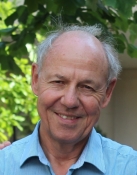
- Ph.D., M.S., Mechanical Engineering, University of California, Berkeley, June 1972
- Dipl.-Ing., Mechanical Engineering, Technical University of Munich, Germany, June 1968
Professor Modest’s research interests cover the two major areas of Radiative Heat Transfer and Laser Machining of Ceramics.
In thermal radiation he has carried out various experimental investigations to measure spectral surface properties of solids, absorption coefficients of liquids, and absorption coefficients of molecular gases; presently, the spectral absorption coefficients of glasses and transmissivities of combustion gases are being measured at high temperatures. His theoretical contributions include development of approximate and Monte Carlo methods to deal with multi-dimensional, spectral, and scattering effects. Present work centers on nongray spectral modeling, as well as Monte Carlo modeling of turbulence–radiation interactions in flames. His 1993 textbook on Radiative Heat Transfer is widely used across the world, and its third edition appeared in 2013.
In the laser machining of ceramics arena, Dr. Modest’s group has done fundamental experimental work and has generated various theoretical models. Experimentally, he has studied the fundamental material removal mechanisms (through SEM, emission spectroscopy, Raman spectroscopy, Auger spectroscopy, high-speed microscope photography, X-ray diffraction, etc.), measured relevant material properties (thermal diffusivity, high-temperature absorptance, heat of ablation/decomposition), and recently investigated the radiative properties of the plume/plasma above the laser-interaction zone as well as thermal stress development and minimization during the machining process. The theoretical models range from approximate one-dimensional to fully three-dimensional, to predict the laser drilling, scribing, cutting and shaping processes. In addition, the models were extended to incorporate effects of elastic and plastic thermal stresses occurring during the process. Presently, Dr. Modest is establishing a model of laser drilling with femtosecond laser pulses in metals and semiconductors.



